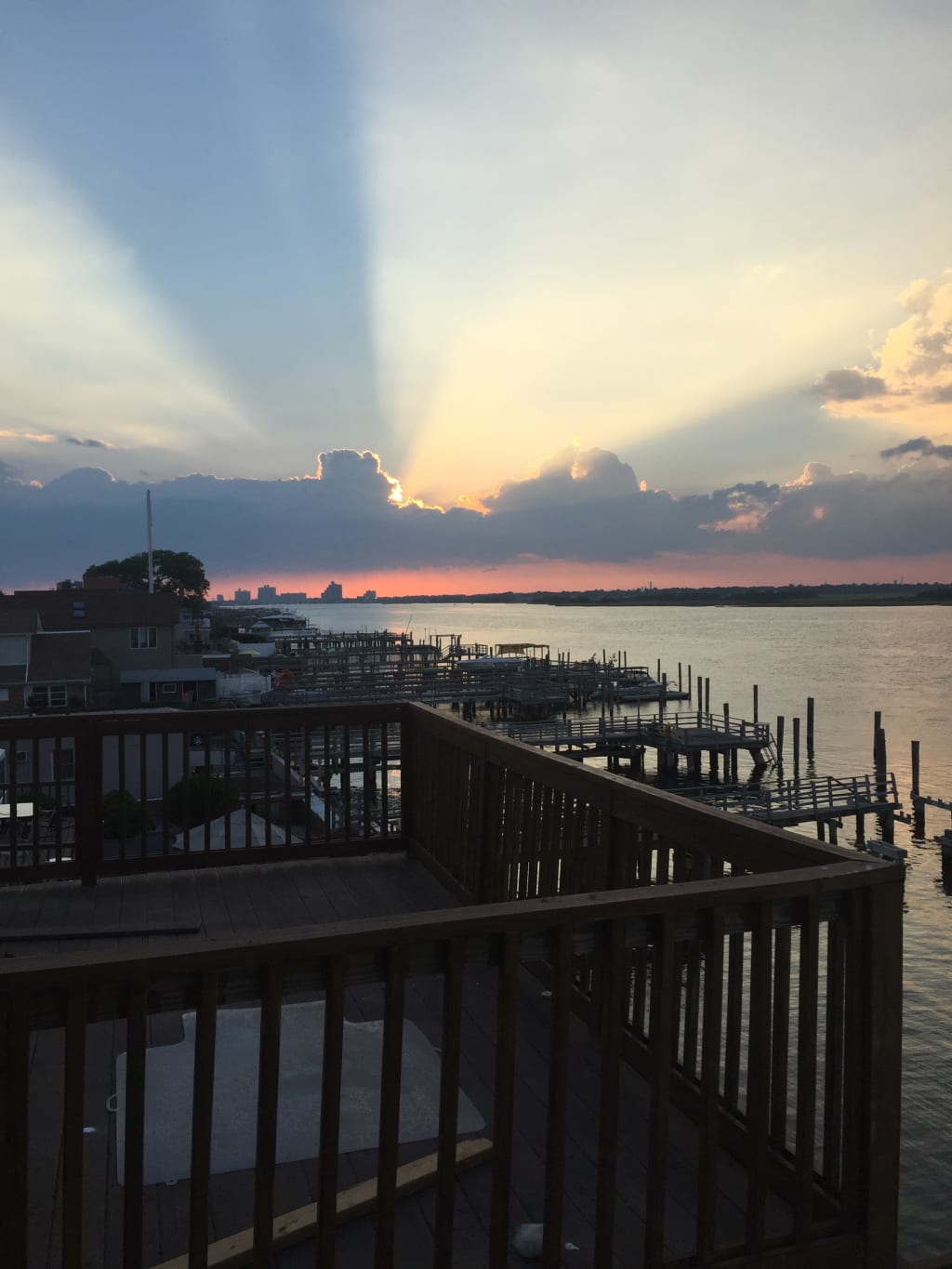
It’s low tide on the bay, and because no bodies have washed up for a week, Grace is allowed to play on the slip of beach beneath our dock. We have maybe an hour before the tainted waves cover the sand and stairs.
“Over,” my grandchild says. I watch from a swing chair that hangs from our second-floor deck. With one rubber-gloved hand she tries to right a horseshoe crab, lying on its back. Her other hand holds something white. I hope it’s a shell.
A cloud shifts and real, summer-hot heat shines through. I pull off my shades and invite the sun to kiss my whole face. Please god, just 20 minutes. I even have a beer, which I raise toward Dan, in the garden, before taking a long, warm sip.
Grace shrieks, chanting: “Tail, tail…”
“No, that hurts them, Gracie-bear, don’t touch.” I rise, stretching muscles sore from chopping furniture for fire, installing more door locks, everywhere … living. The bright side? I am fit. Apocalyptic abs. Holding the old wooden rail, I walk carefully down mossy steps to the sand, pull gloves from my pocket and study the creature for life. Like a spider reclining in a WWII helmet, the crab waves an ebony leg at me.
Good for you, bud, gettin’ some and stayin’ alive.
I grip the lip of his shell, right him and push him to the water. After producing eggs to be sprayed by the much smaller males, the females left their sand niches hours ago. Their sated mates are left to sleep it off before the swim of shame. Signs of successful fertilization are here; tiny black eggs dot the sand like pepper, and patches of creamy bubbles float nearby.
Grace wrinkles her nose and points at the foamy surf. “Is spooge, is Spoogey Bay.” She remembers her late grandfather’s name for the water after the crab raves.
“Graaaace,” I laugh. A warning even a toddler can see through.
“Spooge, spooge,” she calls at the water as I chase her to the stairs and she offers me her little starfish hand to hold. I lift her over a tangled garbage bag caught on the piling. Balancing on each step in rainboots, I notice her wetsuit is tight; she’s growing, despite our sparse diet. She sings as her curly bangs lift in the breeze and her double top-knots rise like fuzzy teddy-bear ears.
“Gracie-McGraceface,” I whisper, and she turns to give me a smile so big her eyes crease. I smile back, undone. Sitting hard on the top step I hug her. Tight. She should protest, but she won’t. My chin on her head, we stare at the city far in the distance. A Manhattan empty of light or life, an uneven skyline with waving wisps of smoke from collapsed buildings and untended fires. The wisdom of her soul knows we need this closeness.
We are all we have. For now.
We wore masks sometimes, to keep the smells of the rank bay at bay. Masks for health wasn’t a thing anymore. If you’re walking around after 26 variants of Covid killed 80 percent of the population, you won the plague. You have to live with the dead, though -- first in cemeteries, now in gardens, under beaches, floating… Grace is my world, now. And every week or so, we see Mateo, the sturdy little man who appeared on our dock one week after Dan died. With a crooked smile he held up a cardboard sign offering “FOOD, GAS, REAL NEWS.” His crew of shadowy guys run supplies in quiet yachts that once hauled families who called themselves “comfortable.” They give me respect I pay for in jewelry, old coins, and, now, cash. Hard to believe our currency, though worth little, is still tradeable. It wouldn’t be for long.
I have to trust Mateo; I keep Gracie away from street markets since Variant 14 took so many little ones; she draws longing in too many red-rimmed eyes.
A wetsuit is hard to strip off of a rolling toddler.
“Give me the shell, babe. Ow!” Sobering pain as a line of red opens on my palm. She freezes, drops it on the couch. It was a shell, it’s now a lethal shiv with a duct-taped handle. What?
“Yady.” Grace looks outside.
“Hey,” I pour vodka over my hand. “You gotta show me what you pick up; bad stuff on the beach.”
Her lips stretch over tiny, clenched teeth.
I smile. She nods, forgiving herself.
“Lady,” she says again, carefully, and looks outside once more.
Oh, hell.
“Can you feed the dogs?” I unlatch our guestroom door and Simon and Art, our chessies, race to the kitchen, a knot of curly brown fur, sharp whines and to-the-death protection. “One cup each, make ‘em sit for dessert.” She toddles to the kibble bin in her skivvies, thrilled at the honor. I’m at the door when I remember to lock the notebooks in their Ziplock bags. Simon ate one last month and Grace, likes to scribble over my words.
They were her legacy, the six tiny blank black notebooks I’d found in Dan’s nightstand drawer, weeks after I’d burned the last of our paper. Technology couldn’t keep his thoughts safe, Dan said. He ordered the booklets in packs of 12, always black. For years, I pulled the curling notebooks from his jeans pockets, between sofa cushions, the floor of the Jeep. I kept all his notebooks as I hoped Grace would keep mine. Her history and our love for her was gel-penned in crowded words. They would be sealed in a bag, along with labeled photos, a memory stick of her sweet dad’s childhood videos, and a DVD of his wedding to her graceful mother.
There is a body under the black bag. I turn and see Gracie waving down at me, the dogs barking beside her. They’ll have to be walked in the front yard until I push the corpse into the current. I’ll do it just after dark, before the rats come out.
I tuck Grace into her camp bed, a twin mattress by the fireplace. “Elsa,” she says, and I start the battery-operated player. If it doesn’t do the job, Shrek will go next and then Toy Story, my favorite.
The player and dvd’s will go with her. I’ll miss movies, miss her. The settlements won’t take me, I’m over 50; resources are limited. We have two local choices that are free and eager to pick her up immediately. I don’t mind that both are religion-based, Evangelical and Catholic, but their Fresh Start Doctrine is chilling: Children are ensured safety, but all ties to “former familial structures are permanently severed.” Real fresh, and reeking of HANDMAID’S TALE.
There are other sanctuaries, many probably mythical. One remains my unattainable fave: the secure Colorado Coalition, near the defunct Denver airport. There, education and science is stressed, family connections are honored, and children are microchipped as public record. And if my son is alive out there somewhere, he will find her. He is strong.
Keeping a family tie, however, is costly. Getting to the CC requires an escort, and that, Mateo estimates, will cost $5,000 or more in metals, more in cash. He knows about Grace and shakes his head when I tell him she’s still here; Long Island is filling with armored militias and armed gangs.
I will bring Grace to the Catholics at the market. Soon.
The smell is noticeable as I approach the stairs in the cooling moonlight. Shallow waves play push-pull with the garbage bag as I enter the cool water. Pulling shears from the pocket of my raincoat, I snip the white plastic rope caught on the piling. As I lift the bag, seawater leaks through a tear. It feels vaguely rectangular. Books, brick of drugs, box of meds? Probably another carton of used covid swabs, that had been a disappointing find. Until it’s opened later, it’s all those things. I throw the Shrodinger’s-Cat-bag of possibilities behind a kayak and turn back.
Just do the work.
Following the rope I see what Gracie saw. Oh, God. The “lady” is a teenager and had been beautiful. An aquiline nose points skyward below a fringe of thick eyelashes. I remove a glove and press my fingers to her cold throat. Aside from a web of tattooed flowers at her neckline, she looks innocent, she looks untouched.
I haven’t seen a teenaged girl for months. Most have gone to the settlements.
Clad in dark pajamas, she floats as silent as Desdemona. I’ve no room in my garden, that’s Dan’s, but maybe I can bury her somewhere. Slipping my arms beneath her, we leave the water with effort. My foot slides through the open second stair back and I fall. Shit!
I’m on my ass and she’s underwater. Struggling to keep my mouth closed I stand against the strong waves, which bring her to the surface, hair covering her face. With a surge of effort I lift and launch her body to the steps; her hair falls to the side and I gasp.
Huge ink black eyes stare at me, and they are all kinds of wrong. Solid black orbs reflect the moon, without a bit of light. The whites of her eyes are dyed a chilling, dead black. No, no.
My shaking hand pulls her pajama top up to reveal the symbol I fear – 6X6, the insignia of a lethal post-plague gang. I see, then, the numerous tattoos about her face, around her coal black eyes. This child is marked. The last issue of the Times had warned of the ruthlessness and growing power of this international gang known for marking women they “owned.” Not an actual tattoo, it was a dye injected under the gel layer of the sclera. The first cases were in LA; it was a torture that often resulted in blindness. It was brutal and it was here in my damned bay.
My God, if they got Grace…
No burial. I’ll take my granddaughter to the market tomorrow. I drop the raincoat and grab the hoe. Back in the water, we float awkwardly toward the current. A wave rolls over the girl, and her eyes close. “I’m sorry,” I whisper, kicking and shivering. Past the bulkhead, I shove her with one hand and then use the hoe gently, to push at her hip. I don’t want to hurt her more than life has. Letting the hoe fall, I watch her float away and then swim for the stairs. Dripping, I gather the wet bag, shears and rope, slip into the basement, bolt the door.
Kneeling inside, I open the bag that I sure-as-shit should have sent with the girl. There are three shirt boxes closed with packing tape, each holding a sealed plastic bag. I cry. I knew it would be cash, I wouldn’t hope, but I knew. It’s not neat, maybe-marked stacks, but messy rolls, baggies and assorted envelopes. I stack 62 hundred’s, 580 twenty’s, 202 ten’s and 36 five’s. I stop counting at $20,000.
I will buy a family tie to my granddaughter, and knot it with a fucking bow.
I dump another bag of garbage into the black bag, tie it with my own string. I’ll burn the plastic rope and envelopes. The baggies I’ll fill with junk. I always had them. I’ll scatter my meager savings with the found horde and pack it in the bottom of our diaper bag.
In the morning, Grace wakes up to a pile of luggage, excited dogs and me, sitting on my mattress, with my third cup of instant coffee. I am all planned out. I try to say hello, but cannot. Grace, reading the room, kneels in front of me and releases a dramatic sigh.
I laugh and look at my girl with her messy topknots and serious big eyes.
“We’re okay, Graceness,” I manage to say. “We’re okay.”
Her eyebrows raise.
“Spooge,” she says.
About the Creator
Julie Anderson Slattery
Mizzou J-School alum, former NYC mag editor, writes horror and YA sci/fi, hikes with dogs, bikes, drinks beer, laughs, and plays with broken glass.






Comments
There are no comments for this story
Be the first to respond and start the conversation.